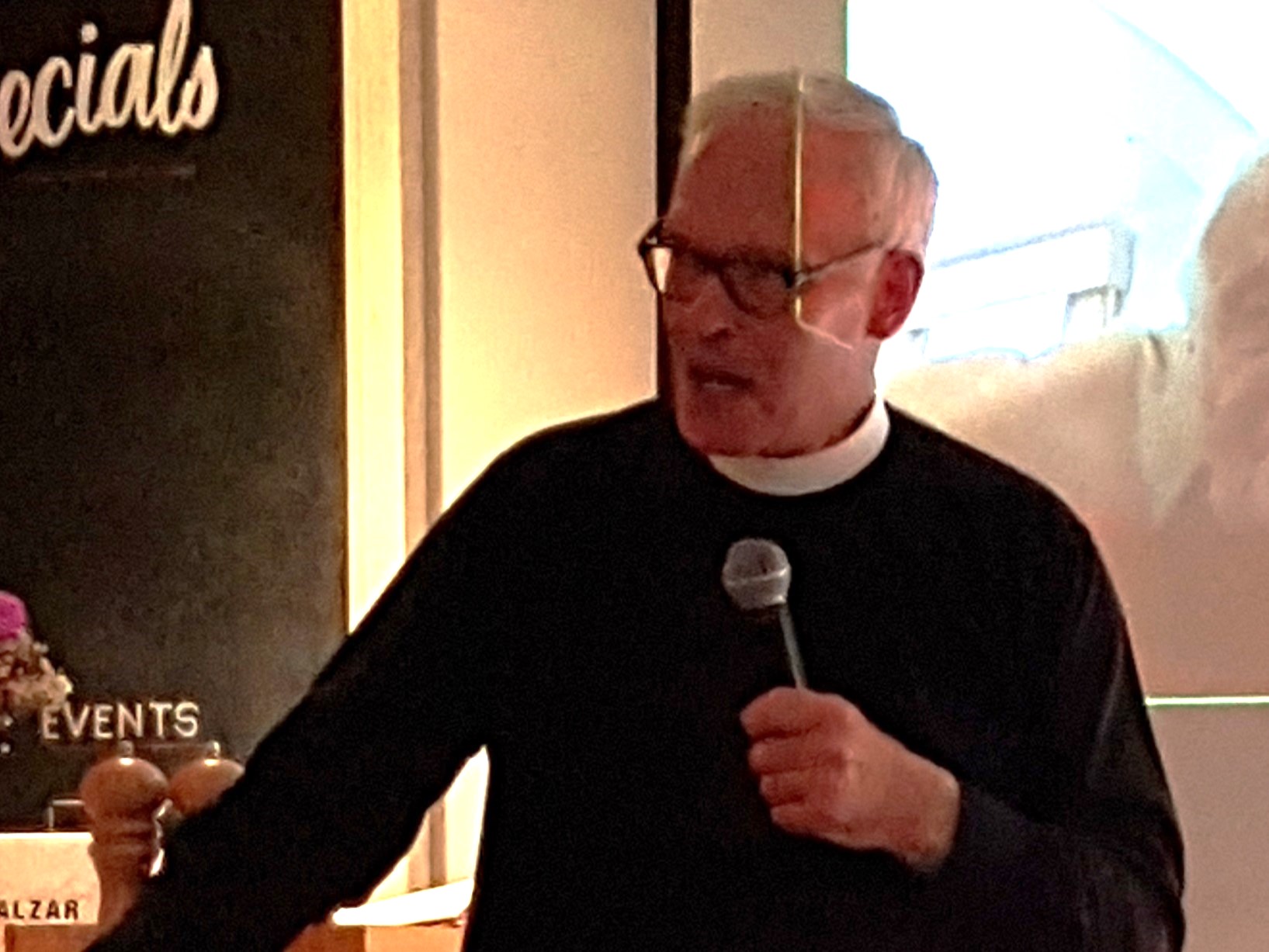
Patrick was introduced to us by our President Steven Thompson, who’s known Patrick since they were at school together; the two have remained very good friends. We were impressed to hear that Patrick is the 7th generation of his family to serve with the Anglican clergy – starting with his great, great, great grandfather many years ago. Patrick studied at Oxford University and then went on to study in Edinburgh; he was ordained in 1981.
Patrick served as a British army chaplain and was posted to a place called Goražde in Eastern Bosnia during the Bosnian War (the conflict in Bosnia and Herzegovina between 1992 and 1995). He started his talk by setting the scene for us and showing us a map to introduce the complexities of the region. The UN, we were told, was sent there to defend the Muslim Bosniak population. The personnel working there were from several different countries. As Patrick described it, “we were quite an international group!”
Patrick peppered his talk with pictures and anecdotes about his work, his colleagues and the local community; we got insight into life in Bosnia (at that time) that one doesn’t get from the TV.
Early on we were shown some very pretty pictures of rolling hills and the camp where Patrick was based – “it looks very pretty,” said Patrick, “but the weather would always change!” In winter temperatures went as low as minus 20°C at night – and there was no heating as Bosnian Serbs had cut off their fuel supplies. They needed firewood for heating and for cooking – but wood was hard to find as locals had already used it, which meant they had to seek wood higher and higher. Describing how the army coped with the situation Patrick remarked: “the British Army can be quite inventive”.
Patrick, who shared his Portakabin with the army doctor, told us that at times serving out in Bosnia felt as if they were recreating the famous TV programme MASH – only in their case the food was very good! He worked with Finnish and Norwegian colleagues while out there and naturally learnt some new words. One word clearly had impact on him: “sisu”, the Finnish word for “strength”.
Patrick told us how he used to always take letters with him when visiting troops and deliver the post! “I was always a very popular visitor” he laughed, adding “at least I performed a useful function!”
In one picture that Patrick showed us a group of people were gathered together for services – in the mountains.
On another occasion he conducted a Eucharist which came under fire from a sniper. He recalled singing a German hymn on that occasion while leading a procession; the fact that he was dressed in priest’s robes meant that the sniper probably didn’t realise he was actually a British army chaplain.
One observation that Patrick made is that soldiers that might not have been overly pious at home became more pious during their time on operations; perhaps they felt differently given the circumstances they were in. Patrick also recounted the sombre time when he arranged a service for a trooper who had been killed; he pointed out that the Serb soldiers attending the memorial service had probably shot him. Thirty minutes later in another location the same British and Serb soldiers came together in another service to mark Remembrance Sunday.
In one story recounting some of the more fun times, Patrick told us how the French had smuggled some bottles of good Alsatian wine into camp. “We had a jolly good party,” he said. While out there Patrick did manage to hold midnight mass and celebrate Christmas – he showed us a picture of troops singing carols; the service, however, was in different languages.
“Talking with the local community was a very important part of my work,” said Patrick, who stressed the importance of building relationships with the locals. We learnt that local children were very keen on “bonbons” and they would always follow him, wanting to know what he was carrying in his rucksack. “I felt like the Pied Piper!” said Patrick – who gained the nickname “Mr Bonbon”! In one picture we saw donkey mail in action, which was unusual. Patrick also told us when he toured Ukrainian outposts giving presents on Saint Nicholas’ Day, he’d noticed the Ukrainians would always send their rations home to their families.
While he was there the British army general, General Rose, visited – which was another of his memorable times.
Patrick, as you might expect, was an excellent speaker, and after the vote of thanks he was given a very warm round of applause by our members.
Picture: Patrick spoke to us during our meeting at Canterbury Rugby Club. Picture credit: Rotary Club of Canterbury.


